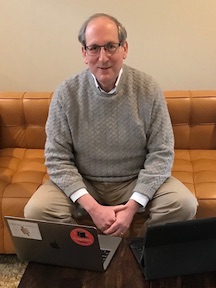By Jacqueline Knirnschild
Before becoming the 10th Secretary and CEO of Phi Beta Kappa, Frederick M. Lawrence served as President of Brandeis University and Dean of the George Washington University Law School. Currently a Distinguished Lecturer at the Georgetown Law Center, he previously served as a Senior Research Scholar at Yale Law School. Lawrence offers his expertise on understanding how COVID-19 will affect higher education in America.
In the $2 trillion rescue bill signed by President Trump last month, only $14 billion went to higher education. Most college presidents argue that it will not be enough and are asking for $46.6 billion in aid in the next stimulus package. Lawrence points out that universities and colleges are being hit hard financially by the pandemic because not only are many refunding the costs of room and board, but they’re also dealing with massive uncertainty surrounding student enrollment, especially international enrollment, in the coming years.
Prior to the global pandemic, American colleges and universities were already struggling with enrollment due to the demographic cliff, which Lawrence explains refers to the fact that the current population of high schoolers is smaller than millennials and the first part of Gen Z. “The same number of colleges and universities are seeking to fill their classes from a smaller number of young people,” Lawrence said. “How are we going to make that happen?”
One way that schools have normally boosted enrollment is by admitting more international students, the majority of whom pay full tuition. “Because of the reputation of American colleges and universities, we have an almost infinite demand of qualified international students,” Lawrence said. But last month, the American Council on Education predicted that international enrollment would drop by 25 percent for the next academic year.
Many domestic students are also rethinking college, deferring, and taking gap years, which will also affect enrollment. Some schools have even extended their decision deadline from May 1 to June 1. Lawrence points out the state of the economy may change students’ decisions about where they want to go to college. “This is particularly a challenge for small, private schools where a lot of people who would’ve been willing to travel distances before might want to stay closer to home and go to the State U.,” Lawrence said.
Aside from finances, the pandemic obviously will also have a huge impact on the quality and programs of higher education. “Higher education in America really has believed, for some time, that among our missions is to prepare students to be global citizens,” Lawrence observed. In order to prepare students to be global citizens, Lawrence said it’s important to make it possible to study abroad for a semester, or at least a summer, and to have lots of international students that are a part of student life. “It’s not just that you took a course in French, or semester in France, but that the person across the hall grew up in a Francophone African country and now she’s part of your world, your life,” Lawrence said. “It broadens your whole worldview.”
“If international students stop coming here and American students stop going abroad, that is a dramatic change in what I think has been an enormously positive development in American higher education,” Lawrence said. “We have made enormous strides globalizing campuses, and at least in the short term that’s going to be harder, so we have to redouble our efforts.” Instead of reflexively reacting negatively to online forms of teaching, Lawrence encourages administrators and educators to explore and improve the possibilities of remote learning. “If international students aren’t able to come in the fall, how can we use technology to include them in a real way? And how do we expose American students to international experiences?”
Despite all the challenges associated with the global pandemic, we can still look for the silver lining. Lawrence believes that with all of the stress, people are learning to value connectivity even more than they used to. He remembers students in his class sitting next to each other and texting instead of talking to each other. “I have a feeling that once this is done, people are going to take what it means to be together a lot more seriously.”
Jacqueline Knirnschild is a senior at the University of Mississippi, where she studies creative writing, anthropology, and Chinese. The University of Mississippi is home to the Beta of Mississippi chapter of Phi Beta Kappa.
Photo: Secretary Lawrence working from his Washington, D.C. home during the 2020 coronavirus pandemic.




